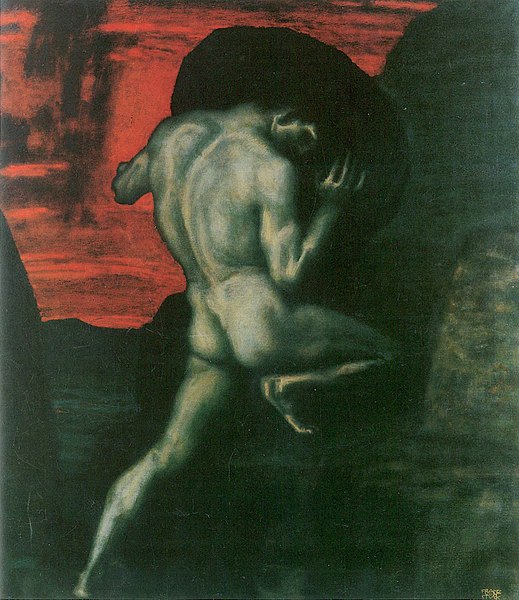Absurdism is the philosophical theory that the universe is irrational and meaningless. It states that trying to find meaning leads people into a conflict with the world. This conflict can be between rational man and an irrational universe, between intention and outcome, or between subjective assessment and objective worth, but the precise definition of the term is disputed. Absurdism claims that existence as a whole is absurd. It differs in this regard from the less global thesis that some particular situations, persons, or phases in life are absurd.
Sisyphus, the symbol of the absurdity of existence, painting by Franz Stuck (1920)
Kierkegaard designed the relationship framework based (in part) on how a person reacts to despair. Absurdist philosophy fits into the 'despair of defiance' rubric.
In psychology and psychotherapy, existential crises are inner conflicts characterized by the impression that life lacks meaning or by confusion about one's personal identity. Existential crises are accompanied by anxiety and stress, often to such a degree that they disturb one's normal functioning in everyday life and lead to depression. This negative attitude towards life and meaning reflects various positions characteristic of the philosophical movement known as existentialism. Synonyms and closely related terms include existential dread, existential vacuum, existential neurosis, and alienation. The various aspects associated with existential crises are sometimes divided into emotional, cognitive, and behavioral components. Emotional components refer to the feelings they provoke, such as emotional pain, despair, helplessness, guilt, anxiety, or loneliness. Cognitive components encompass the problem of meaninglessness, the loss of personal values or spiritual faith, and reflections about one's own mortality. Outwardly, existential crises often express themselves in addictions, anti-social and compulsive behavior.

Feelings of loneliness and insignificance in the face of nature are common in existential crises.



